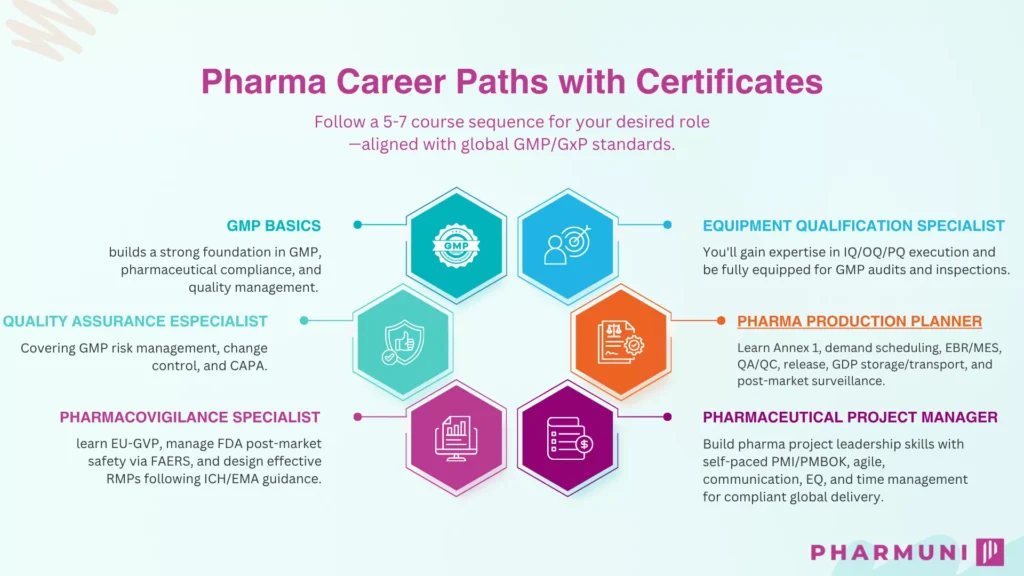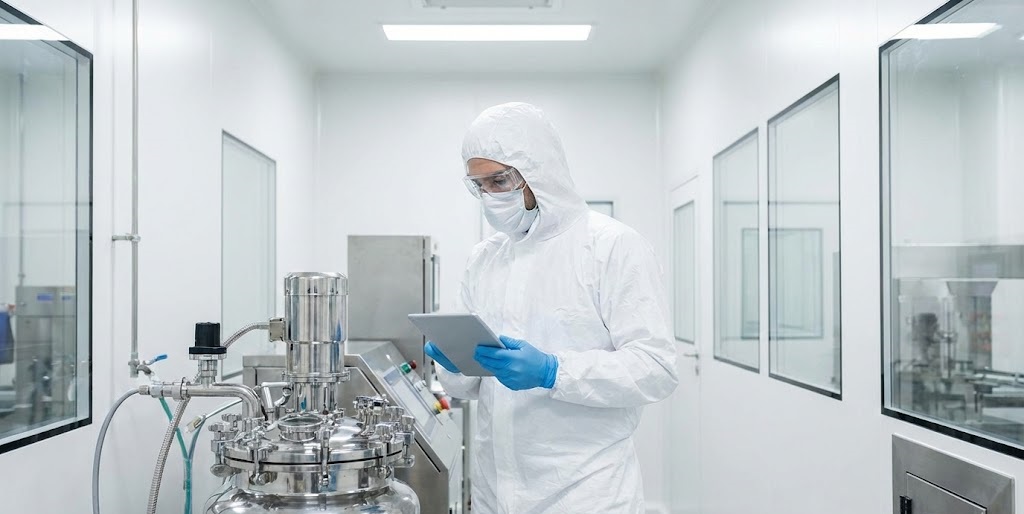Careers in Pharma grow fast and keeps hiring. Global medicine spending continues to rise as new therapies reach patients. Meanwhile, healthcare roles expand and open doors across lab, quality, and data teams. Therefore, pharma career path offer strong opportunity in 2026. Moreover, the U.S. Bureau of Labor Statistics projects healthcare occupations will add about 1.9 million openings each year through 2034, driven by growth and retirements. That momentum lifts many pharma-adjacent roles, from clinical research to manufacturing.
In this article, we will explore the Top 10 Careers and how Pharmuni can help you on your journey in the pharmaceutical industry.
Why choose Careers in the Pharmaceutical Industry?
You build solutions that matter. You help deliver safe, effective medicines to patients. Additionally, you join an industry that invests heavily in R&D and new technologies.
Advantages
- Stability and purpose. Demand for medicines and vaccines remains high. You see real public-health impact.
- Innovation at speed. Companies adopt AI, advanced analytics, and novel trial designs.
- Transferable skills. Quality, data, regulatory, and GxP skills move across roles.
- Global mobility. Pharma hubs span the U.S., EU, India, and beyond.
Challenges (be ready)
- Regulation is strict. You must follow GMP, GCP, and safety standards, always.
- Documentation is heavy. Audits and inspections expect precise records.
- Timelines shift. Trials, validations, and launches can change quickly.
- Continuous learning. New science and systems evolve fast.
Top 10 Careers in pharma industry
Below are the top 10 careers with one-line snapshots. Use them to shortlist paths and plan your upskilling.
Quality Assurance (QA) Specialist
Ensure products, processes, and documents meet GMP and company standards.
Pharmacovigilance Associate
Collect, analyze, and report adverse events to protect patient safety.
Regulatory Affairs Officer
Prepare submissions, manage approvals, and maintain compliance across markets.
Clinical Research Associate (CRA)
Monitor trial sites, verify data, and uphold GCP and protocol integrity.
Validation Engineer
Qualify equipment, utilities, and computerized systems for consistent, compliant performance.
Production/Manufacturing Executive
Run shop-floor operations, manage batches, and ensure timely, compliant output.
R&D Scientist
Design experiments, generate data, and translate findings into pipeline candidates.
Medical Science Liaison
Bridge science and practice; educate clinicians on evidence and appropriate use.
Pharma Marketing Manager
Shape positioning and campaigns with compliant messaging and real-world insights.
Biotech Data Analyst
Turn lab, clinical, and commercial data into decisions using statistics and ML.

Skills and Qualifications Needed for Pharma Careers
Recruiters want clear, verifiable capability. Therefore, build the mix below and show proof with projects or certificates.
Technical & compliance
- GMP/GCP/GDP basics. Understand quality systems, change control, CAPA, and audits.
- Documentation fluency. Write SOPs, protocols, reports, and data narratives.
- Validation know-how. IQ/OQ/PQ concepts; risk-based approaches; CSV/Annex 11 awareness.
- Data literacy. Excel, statistics, and at least one analytics tool (e.g., Python, SQL, or Power BI).
Role-specific
- QA/Manufacturing. Deviation investigations, batch records, and release workflows.
- CRA/Clinical. ICH-GCP, site monitoring, eTMF, and EDC tools.
- PV. Case processing, MedDRA coding, signal detection, and PSUR/DSUR support.
- Regulatory. Dossier structures (eCTD), labeling, and variation/renewal cycles.
- R&D/Data. Experimental design, biostats, and domain-specific ML or bioinformatics.
Human skills
- Communication. Translate complex science for non-experts.
- Problem solving. Use root-cause tools and risk assessments.
- Collaboration. Work cross-functionally with QA, RA, Clinical, and Manufacturing.
- Adaptability. Learn new platforms, guidelines, and therapeutic areas quickly.
Job outlook and salary trends in 2026
Outlook remains strong. New modalities, aging populations, and chronic-disease burden drive sustained hiring across discovery, development, and manufacturing. Furthermore, official projections show robust growth in science roles.
- Medical Scientists (R&D): +9% job growth (2024–34); $100,590 U.S. median pay (May 2024). These roles support translational research, biomarkers, and new modalities.
- Biochemists/Biophysicists: +6% growth; $103,650 median pay (May 2024). Employers include pharma manufacturing and R&D services.
- Clinical Lab Technologists/Technicians: $61,890 median pay; steady openings from retirements and replacements even with modest growth.
Beyond the lab, commercial and medical roles also expand as pipelines diversify. Meanwhile, global medicine use continues to rise through 2029, supporting demand for QA, regulatory, and safety professionals. Consequently, career mobility across functions remains high in 2025.
Pros
- Impactful work
- Competitive pay
- Clear progression
- Global mobility
Cons
- High compliance load
- Strict timelines
- Frequent audits
- Constant upskilling
Entry routes if you want to get into pharmaceutical industry
- Start in QA documentation, manufacturing ops, or lab tech roles and cross-train.
- Join CROs in data, site support, or PV case processing.
- Leverage internships and certificate projects to prove hands-on skill.
- Build a portfolio: protocols, analyses, and brief validation or PV case write-ups.
Salary note: pay varies by country, company size, and therapeutic area (oncology and biologics often pay more). Use official statistics where available, then compare with local job boards to benchmark ranges.
Final words
You can build a meaningful, well-paid career that improves patient lives. Furthermore, the industry’s steady growth across R&D, manufacturing, and safety keeps opportunity broad in 2025. Choose one of the top careers in pharmaceutical industry, match the skills required, and start stacking experience with practical projects and certificates. For a guided route, explore Pharmuni’s Pharma Career Path page and pick the lane that fits your goals.
FAQs
Yes. Demand for science, quality, and safety skills remains strong. Moreover, healthcare openings stay high across the decade.
QA documentation, PV case processing, regulatory coordinator, and manufacturing technician roles often hire early-career candidates.
Translate your thesis or lab projects into GxP-friendly stories. Then, showcase protocols, data integrity, and reproducibility. Finally, add targeted certificates to bridge gaps.
References:

Stephanie Männicke
Digital Marketing Especialist at Zamann Pharma Support, brings 8 years of experience in Corporate and Digital Communication. Specializing in Digital Marketing and Content Creation, Stephanie is currently focused on creating strategic content for Pharmuni's networks, especially content on topics such as recruitment, onboarding and employer branding. Outside of work, Stephanie is a mum, a crocheter and a movie fan. An avid reader and in search of expanding her knowledge, Stephanie is always looking for ways to innovate communication in the digital environment and connect people in a genuine way.

Revalidation In Pharma (2026 guide): Meaning, Triggers, Frequency, And Requalification Differences
Revalidation protects product quality and business continuity by linking GMP decisions to risk, evidence, and context. This article helps teams decide when to act, what

GMP Regulations in 2026: How Inspectors Assess Compliance and Control Systems
This article explains how pharmaceutical regulatory requirements shape inspection decisions, why GMP compliance gaps persist across manufacturing sites, and which operational controls, documentation practices, and

WHO GMP in 2026: Inspection Readiness and Compliance Expectations
This article explains how global pharmaceutical GMP standards are applied during inspections, why operational gaps persist despite formal compliance, and how quality systems, contamination control,


